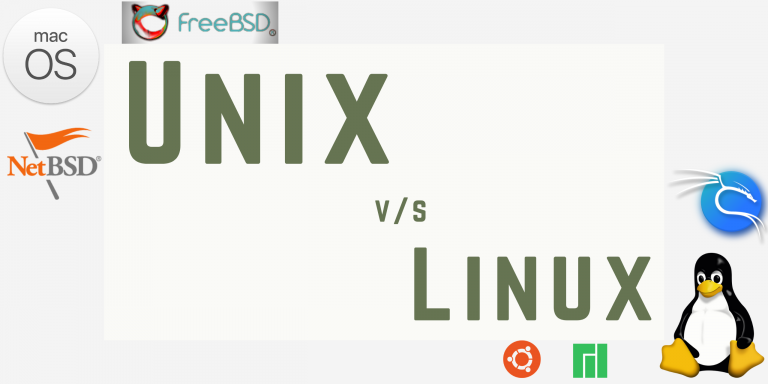In the modern world, Unix vs Linux are at the core of the tech industry as most of the technologies rely on Unix and Linux, one way or another. Unix is preferred by lots of organizations, while Linux being flexible is used almost everywhere from embedded systems to space rockets.
Many of us have somewhere or someday have come across both Linux and Unix, but mostly we are unable to differentiate them.
In this article, we will discuss Unix and Linux, and how they differ from each other. We will also provide you with some really interesting facts that you would not be knowing.
What is Unix?
Unix is a family of operating systems, created with the intent of providing multitasking and supporting multi-user functionalities to Operating Systems. It was built in the 1970s by a group of AT&T employees at Bell Labs.
There are various popular Unix variants like Solaris, macOS and BSD.
Some interesting facts about Unix
- The Unix trademark is owned by The Open Group.
- Unix does not have a logo, it is represented by writing UNIX in all caps.
- Dennis Ritchie also contributed to the development of Unix.
- It is written in C and Assembly language.
Limitations of Unix
- Unix does not have a friendly user interface.
- It lacks consistency, as versions on various machines differ slightly.
- Unix is slow compared to Linux, as it was not designed for fast performance.
- Less documentation is available for many of the tools.
What is Linux?
Linux denotes a family of Operating Systems built on Linux Kernel. Linux is a Unix-clone, built from scratch. It is very similar to Unix but faster.
Most of the web servers run on Linux because of it. Almost everything around us uses Linux, even our Android phones do. Linux is open source, which made it so popular that the market has Linux distributions suiting for all types of needs. There will always be a Linux distribution that suits you.
There are various popular Linux distributions in the market like Ubuntu, RedHat, OpenSUSE, Debian, Fedora and Kali Linux.
Some interesting facts about Linux
- Linux refers to the kernel, not the operating system.
- Linux can run almost anything from mobile phones to space rockets or submarines
- 95% of the code of Linux is written in C.
- 90% of the Hollywood special effects rely on Linux.
- The android operating system runs on the Linux kernel.
- 96.35 of the top 1 million servers run on Linux.
- 9 out of 10 public clouds run on Linux.
- All of the top 500 fastest supercomputers run on Linux.
Limitations of Linux
- Linux does not have good support for device drivers which results in malfunctioning of the system.
- Learning Linux is difficult for beginners. It is hard to find a fix to a problem.
- Linux isn’t meant for gaming. Very few games are developed for Linux, so game developers are more interested in Windows.
- Many software like Adobe Photoshop and Microsoft Office are not available for Linux.
- Using Windows applications on Linux via emulator is a very complicated process.
Differences between Unix vs Linux
| Unix | Linux |
|---|---|
| Unix is proprietary. | Linux is open source |
| Unix was created in 1960s by AT&T Bell Labs. | Linux was created in 1991 by Linus Torvalds. |
| Unix default shell is Bourne Shell. | Linux default shell is Bash. |
| Unix can be installed only on web servers, workstations and PCs. | Linux can be installed on any device from mobile to supercomputers. |
| Various file systems supported by Unix are fs, gpfs, hfs+, hfs, zfs, xfs, ufs. | Various file systems supported by Linux are Ext2, Ext3, Ext4, jfs, NTFS, FAT, FAT32, Btrfs, xfs, vxfs. |
| Its source code isn’t publicly available. | Its source code is publicly available. |
| Unix was developed for servers, workstations and mainframes. | Linux can be used by anyone from a student to a developer. |
| Some popular examples of Unix Operating Systems are Solaris, SunOS, macOS, BSD. | Some popular examples of Linux Operating Systems are Ubuntu, RedHat, Debian GNU, OpenSuse. |
Conclusion
Unix vs Linux has its specific uses, limitations, and various interesting facts about them. We also talked about some key points where Unix and Linux differ from each other.





